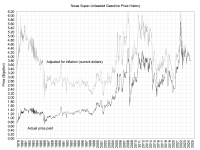The economics of oil are complex and fascinating. My guess is that Dr. Chu would like to see oil prices increase for at least two reasons. First, many economists believe that using oil produces a variety of externalities. By definition, these externalities are not accounted for in the price you pay at the pump. By forcing oil companies and oil users to internalize their externalities, people will be forced to consume less or pay for the damage that their consumption causes.
The second major advantage of higher oil prices, whether they are caused by increases in demand, decreases in supply, speculative pricing, or government intervention is the effect this has on the incentives for consumers and companies. While alternative forms of energy might not make sense with oil at $20 a barrel, they may make a lot of sense when oil costs $200 a barrel. Basically, higher oil prices make other energy forms more economically viable and can help spur research and development.
This is not to say that increasing oil prices are good for the United States. For better or for worse, we live in a country that is highly dependent on oil and it looks like that will remain true for quite some time. Higher oil prices certainly cause hardship for millions of Americans who have built their lifestyles around the prevalence of cheap gasoline, and this system will take time to change. But oil is priced on a global market, and the government has few resources at its disposal to lower the price of oil. Increasing US oil production will likely have a minor impact on global oil prices (and, by extension, local oil prices), but at least more of the money would be kept in the US economy, assuming that the recipients of the new oil wealth spend their money in the US. I'm slightly involved in the Eagle Ford shale in South Texas, a promising new oil field. Interestingly, the Chinese state oil company invested over 2 billion dollars in Chesapeake Energy for drilling the Eagle Ford, so a lot of the profits will be sent overseas.
Moreover, much of the new US oil production is relatively expensive. Saudi oil, for instance, is really cheap to produce at $4-6 per barrel, while the oil shales in the US are more in the range of $52-113 per barrel (IEA 2008 numbers, the most recent I found in a quick search). New technologies may lower the production costs of oil shale, but it probably will remain quite expensive. Economically, this only works when the price of oil is relatively high.
This isn't an area where the government can dictate prices. Many economists argue that the US government already subsidizes oil significantly, directly and indirectly.
David Brooks was on Meet the Press recently and said that during the Bush price spikes Democrats overwhelmingly blamed the president for the high gas prices. During the Obama price increases, Democrats seem to think it's not the presidents fault. The reality, according to Brooks, is that the president has very little control over oil prices. The point is, people like to blame politicians they don't agree with for problems, even if the politicians didn't cause and can't control the problem.

